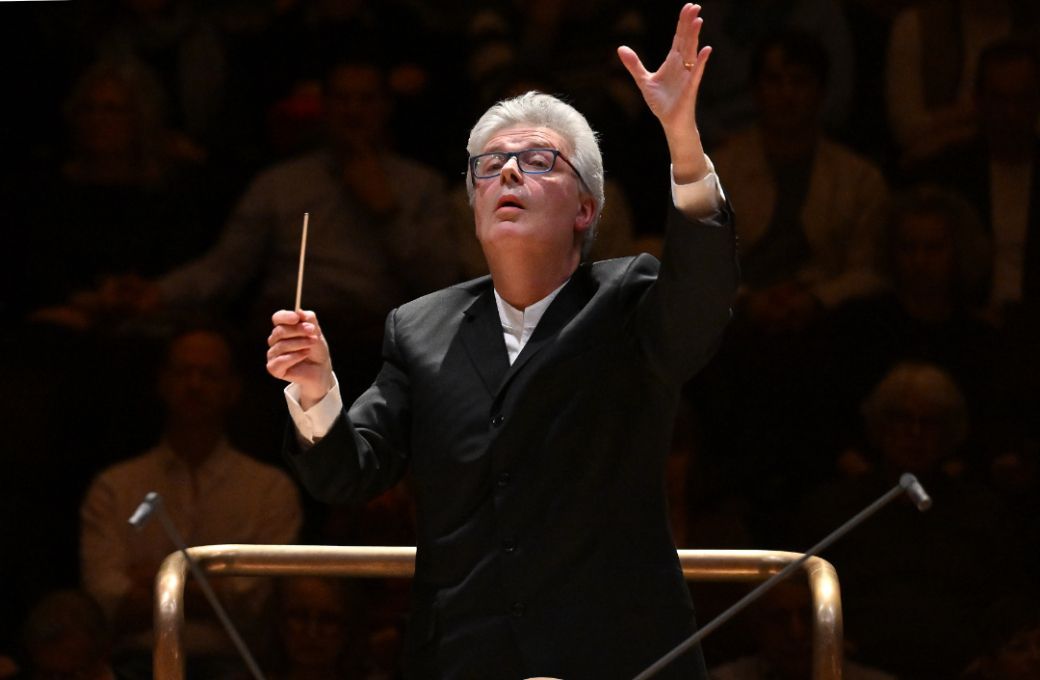Under the baton of Sir James MacMillan, the BBC Symphony Orchestra gave four works concluding with the UK premiere of his recent cantata Fiat Lux. This darkness to light trajectory at the Barbican also included the presentation of an Ivors Academy Fellowship to the composer in recognition of his achievements and impact within the world of music.

Some 30 years ago a radio broadcast of the Seven Last Words on the Cross announced MacMillan as a major new figure on the British choral scene. Since then, he has produced an impressive catalogue of choral works, including two passions directly inspired by the events of Holy Week. His Fiat Lux (Let there be Light), premiered last year in the US by the Pacific Symphony and Pacific Chorale, is his latest Catholic faith-inspired contribution to sacred music. Setting ancient and contemporary words, mostly by American poet Dana Gioia, MacMillan writes for baritone and soprano soloists, chorus, organ and orchestra (with an extensive percussive section), conceiving the work for the consecration of Christ Cathedral in Southern California. Its celebration of the divine gift of light unfolds in five unbroken sections moving through Genesis, reflections on the relationship between light and nature, Christ as the Light of the World and finally closing with a dedication to the new building.
It's a work of colourful and dramatic effects, promising much in its imaginative orchestral textures but delivering little in its vocal angularities and verbal repetitions. Strings shimmered and hurtled up and down in a frenzy of excitement, a delicate celesta caught the ear, so too massive organ chords, while some fine a cappella singing showed the voices of the BBC Symphony Chorus on good form. No less secure were soprano Mary Bevan and baritone Roderick Williams who grappled heroically with ungratifying vocal lines, each bringing warmth of tone and clarity to the English and Latin texts. But despite every effort from those on stage, the resounding “Amen”, following a prosaic chorale, failed to lift this work onto a transcendent level.
Proceedings had begun earlier with a polished account of Arvo Pärt’s Cantus in memoriam Benjamin Britten, a less is more work combining simplicity of technique and richness of expression. It’s become a signature Pärt piece and under MacMillan’s clear, if expansive, direction, its descending scales, like tears of lamentation, were beautifully sculpted. There followed an assured performance of Britten’s Sinfonia da Requiem, a work that once prompted Paul Griffiths to regret the composer “did not do more in the purely orchestral field”. That’s as maybe for those who think well of the work as I did when I first heard a compelling performance of it at the 1975 Proms.
Here, the BBC players gave a detailed rendition with flawless solo contributions, but its sense of nervous excitement and mystery felt a little remote. Those qualities never quite emerged either in Einojuhani Rautavaara’s string orchestra work Into the Heart of Light. Perhaps that’s because the attractions of this prolific composer continue to elude me. His Canto V is a characterful, if unpredictable work, its ardent expression culminating in a rapt cello solo, its luminous afterglow the perfect link to MacMillan’s light-filled cantata.


